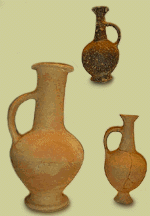
Bilbils
were storage jars that
originated from Cyprus. Some scholars believe that
these vessels were used for the widespread trade of
opium in the Late Bronze Age. The shape of the
bibil bears a resemblance to the poppy
plant.
|
The southern Levant always has been crossed
by many travel and trade routes. Along these roads,
ideas and information were exchanged along with
goods and services, thus opening Canaan, and later
Israel, to influences from throughout the ancient
world.
In the Late Bronze Age, Canaanite traders
played a key role in the first period of
international sea trade in the Mediterranean. They
were part of a thriving commerce between Egypt,
Cyprus and Greece. Underwater archaeologists have
recovered Canaanite storage jars along with copper
ingots, luxury goods, and pottery from Cyprus and
Greece from the cargoes of Late Bronze Age
shipwrecks off the coast of Turkey.
In the Iron Age, the impetus for renewed
international trade came form the Phoenicians who
traveled widely in search of metal ores and also
established a network of colonies throughout the
Mediterranean. By the end of the 8th century BCE,
some of the Greek city-states began to send out
colonists throughout the Mediterranean and also
dispatched traders to the Levant in search of
luxury goods like ornate metal bowls and carved
ivories.
|

